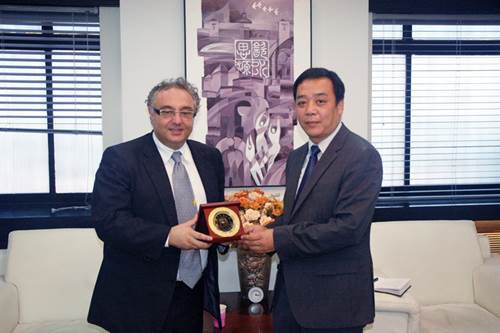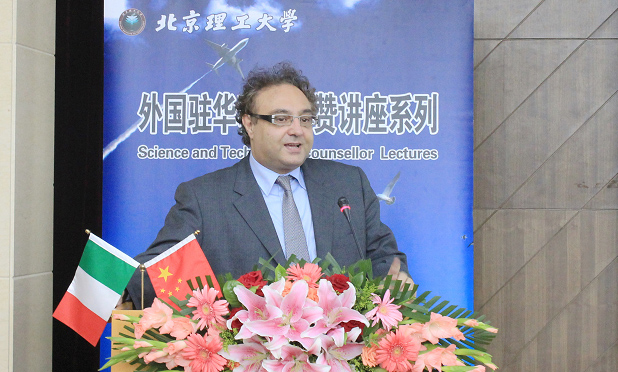Professor Innocenzi is the Science and Technology Counselor at the Embassy of Italy in the People’s Republic of China in Beijing. He is also a full professor of Materials Science and Technology at the University of Sassari, Italy. He has served as the Italian scientific attaché to China since 2010.
Few areas have been impacted more by globalization than science. For a long time this globalization involved just the West, with Japan successfully appearing on stage in the last century. Nowadays, looking at the scientific panorama, the scenario has become less well-defined. Russia, previously the principal challenger to Western power, is no longer taking a leading role while global and local superpowers such as China, Brazil, and India have risen to the forefront. Without a doubt, this change has brought a very positive impact when it comes to our capability of solving complex problems in which world-wide cooperation and significant financial resources are necessary—such as in the case of the fusion reactor project ITER or the Genome project, to name just two—but it also poses new challenges to the old way of doing things.
In the West, science has risen as a result of a long process of inquiry involving shared ethical values. Progress in science and technology has not always been a linear process and has not always yielded positive results. Science at the service of military needs could hardly find a place in the fundamental values that most scientists consider the basis of their work. But now the rise of countries like China to the rank of scientific superpower has brought a very different way of thinking, mostly because China’s political system is not a democratic one. Because of this basic difference, depending on economic and military issues, collaborations can easily turn to confrontation. This is exactly where science diplomacy can work very well, as a tool to reduce cultural barriers between countries and to foster collaboration. Since science and technology represent the very basis of the knowledge economy, there has naturally been heightened competition between nations to obtain and possibly control this basic asset. But in the end, the language of science is, by its very nature, open, international, and inclusive, which is why science and technology have more and more occupied a central role in international diplomacy.

The problem is that things do not always work as smoothly in fact as they do in theory. Knowledge has a high value and people are not always so willing to share what has been acquired through long and arduous effort. This is particularly true of technology protected by copyright. This has become a very delicate issue since not all countries, particularly China, are in fact ready to protect property rights or even to acknowledge the importance of it. All too often, shortcuts such as acquiring technology by copying it, leaking it, or through reverse engineering seems to be easier, at least in the short term. Again, science diplomacy becomes very important, since if offers the possibility of a different path of actually making things together. It allows for developing new knowledge and technologies together, sharing the risks as well as the benefits.
While this assumption may appear quite simplistic and obvious, in my personal experience, it is one of the most difficult aspects of scientific collaborations involving developing countries, in particular if this country is a giant like China. In China, there is the general attitude that developed countries should provide knowledge for free and transfer technology also for free. Especially in the case of China, this has occurred on an unprecedented scale and is the basis of the economic boom of the country. Without this massive transfer of know-how and technology, it is doubtful we would have seen such extensive development in China in such a short time. This technology transfer, of course, has not occurred for altruistic reasons. Companies and governments in the West have seen a clear advantage in developing a new huge market with nearly an endless reservoir of cheap and skilled labor. Another problem is that what is good for a private company is not always good for a country. Delocalizing production to a place where production costs are much lower may boost profits for a company but means cutting many jobs at home without necessarily an advantage for the consumer who will buy the same goods at the same price.
Scientists, however, have the advantage of being able to take a much longer view and a wider perspective. They are also not so dependent on quick profits. It is precisely for this reason that science diplomacy can work so well to establish strong collaborative roots with the potential to endure for decades and to survive conflicts. Personal relationships built working together in a laboratory, sharing the enthusiasm and the love for science establishes a link that goes beyond cultural differences and can last a lifetime.
Of course, bottom up collaborations that start from personal contacts between researchers are relatively easy business compared to large scale projects that need significant financing. In this case, politics inevitably plays an important role, especially in getting the political establishment on both sides to see the real advantages inherent in an international collaboration, including sharing costs and using complementary knowledge that may not be available in a single country. That has largely been my role. Sometimes this takes a lot of time and effort but it is also highly rewarding and in general can mark a significant step forward in bilateral relationships. Governments around the world now clearly see the advantage of international collaborations and are rushing to establish international research institutions and universities with the intention of building a permanent link between countries. This is not only a potential advancement for science but also an important tool for business.
Science diplomacy is all these things, and works both ways. Cultural barriers exist on both sides and my job each day is to carefully explain the reasoning of one side to the other, avoiding conflicts and finding opportunities for mutual benefits. I’ve found that being an active scientist and a diplomat is a fantastic opportunity, especially if you believe in the possibilities of peaceful and collaborative joint work. In the end, scientists know very well that the world is full of opportunities and new discoveries are just around the corner.



